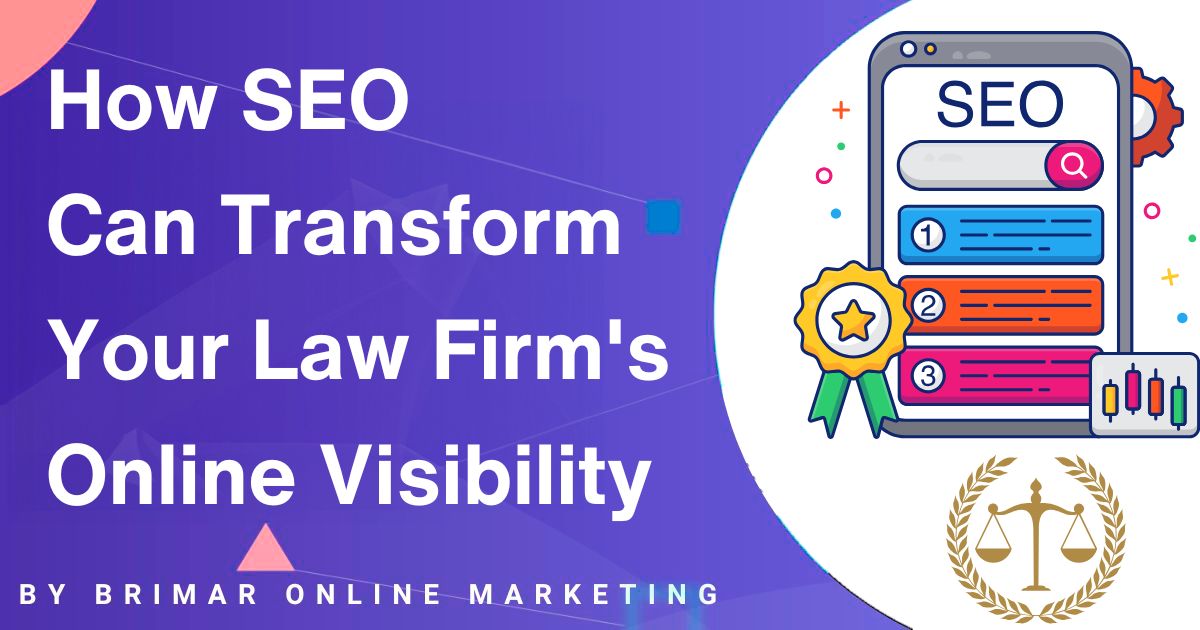
When people need legal help, they use search engines to find answers and connect with professionals who can provide solutions.
Imagine if your law firm appeared at the top of those search results, becoming the first-place potential clients look for trusted advice and guidance.
This illustrates the potential of Search Engine Optimization (SEO).
For law firms, SEO is not just about getting noticed; it’s a strategy that builds credibility and reaches people precisely when searching for legal support.
With so many law firms competing for visibility online, SEO is the tool that sets you apart.
It draws in organic traffic, enhances your website’s content to answer critical questions, and ensures your firm stands out to those seeking your services.
In short, SEO doesn’t just drive more website visitors; it connects you with the people most likely to become clients.
The Critical Role of SEO for Law Firms
Why SEO Matters for Law Firms
SEO is a powerful strategy that gives law firms a competitive edge by making their services highly visible in search engine results.
Potential clients seek help with legal issues daily, from divorce and immigration to personal injury and corporate law.
With SEO, your firm can rise to the top of these search results, making it easier for those in need to find and trust your services.
Beyond ranking higher, SEO allows your firm to create a digital presence that resonates with prospective clients.
By optimizing for relevant keywords like “legal services,” “law firm near me,” and specific practice areas, you position your firm as a top choice, especially when those searches come from people in your local area.
SEO helps you capture clients when they’re looking for legal help, which is a massive advantage in an increasingly competitive landscape.
Start Attracting Customers Through SEO Today!
We can help you attract new customers through Tailored Search Engine Optimization Strategies for Your Business.
Understanding the Target Audience
To connect with the right clients, a law firm needs first to understand who those clients are and what they’re searching for.
Knowing your target audience enables you to choose the right keywords that align with what potential clients type into search engines when seeking legal advice.
For instance, if your focus is family law, using keywords like “divorce attorney” or “child custody lawyer” will make your website more visible to people needing those services.
When you target relevant keywords, you’re increasing visibility and attracting clients actively looking for your legal expertise.
Effective SEO means speaking directly to the people already searching for your services, making it a highly targeted approach.
SEO as a Long-Term Strategy
SEO isn’t a quick fix; it’s a strategy that builds up over time.
By consistently working on SEO, your law firm builds a strong online presence that grows with each update and each piece of new content.
A well-planned SEO strategy will keep your firm on top of search engine results, continually reaching new potential clients while maintaining a steady client base.
Over time, this strategic approach translates to more qualified leads, better brand recognition, and a reputation for being a go-to source for legal support.
Each piece of content you create, each keyword you optimize, and each positive review you gain adds to the long-term benefits of your SEO efforts, building a sustainable pipeline of clients and helping your firm thrive online.
With the right SEO strategy, your firm doesn’t just get noticed once; it becomes a lasting presence that clients can rely on, supporting a steady and sustainable growth trajectory.
Core SEO Strategies for Law Firms
Keyword Research for Law Firms

When it comes to SEO, selecting the right keywords is the foundation of your strategy.
Use keywords as the direct line between what people are searching for and how they find your firm.
Choosing terms like “legal services,” “practice areas,” and specific local keywords helps ensure your law firm shows up in the search engine rankings when potential clients seek legal help.
Use Tools Like Google Keyword Planner
To get a jumpstart on finding the best keywords, tools like Google Keyword Planner can be a game-changer.
These tools let you explore the phrases and questions people seek.
And beyond just a list of keywords, they show search volumes, competition levels, and trends, so you can pick phrases that have real potential to drive traffic to your site.
On-Page Optimization and Content Creation
Your law firm’s website content can be a powerful magnet for new clients if it’s done right.
High-quality content, whether it’s a blog post or an FAQ section, doesn’t just help answer common questions; it also builds trust and authority.
Regularly publishing informative content that provides valuable insights into legal issues positions your firm as a go-to resource.
On-Page Optimization Techniques
Optimizing your content doesn’t end with simply creating it.
On-page elements, such as meta descriptions, header tags, and internal links, also play a massive role in your site’s performance.
Meta descriptions should be clear and to the point, helping potential clients understand what each page is about.
Using header tags organizes your content and helps search engines interpret your site’s structure.
Internal links guide visitors to related information on your site, keeping them engaged and improving user experience.
All these small steps combined lead to a site that users and search engines appreciate.
Technical SEO and Mobile Optimization
Technical SEO keeps your site’s backend running smoothly.
In today’s mobile-heavy world, ensuring your site performs well on mobile devices is vital.
Mobile optimization means that your site loads quickly and looks good on any device, which pleases your visitors and is also rewarded by search engine algorithms.
Focus on Best Practices
Some crucial elements of technical SEO include maintaining fast loading times and implementing mobile-friendly designs.
Search engines like Google prioritize sites that load quickly and are easy to navigate on a smartphone, meaning your law firm can gain an edge with these optimizations.
Investing in technical SEO can make a tangible difference in how well your site ranks, directly impacting how many people find you.
Leveraging Local SEO for Law Firms
Google Business Profile and Local Search Results

A solid Google Business Profile is one of the quickest ways to improve your local search presence.
This profile includes essential information like your location, hours, and services, making it easier for potential clients to find you.
Showing up in local search results and Google Maps is a huge advantage, particularly for people looking for immediate legal representation nearby.
Importance of Local Search Results and Google Maps
When people search for legal help in their area, local search results are often the first place they look.
Being visible on Google Maps and having an optimized Google Business Profile makes it easy for potential clients to choose your firm based on the options they see.
It’s a straightforward way to attract clients who are already nearby and need your services.
Positive Reviews and Online Reputation
Online reviews have become today’s word-of-mouth marketing, and for law firms, they’re essential.
Positive reviews help you build credibility, a deciding factor for many potential clients.
It’s worth reaching out to satisfied clients and encouraging them to leave reviews on your Google Business Profile and other review platforms.
These testimonials speak volumes about the quality of your service and can help you stand out from competitors.
Managing Your Online Reputation
A proactive approach to collecting reviews and responding to feedback can significantly enhance your law firm’s online presence.
Positive reviews do more than boost your visibility; they foster trust with new clients, making them more likely to choose your firm when they need legal support.
Directory Listings and Local Keywords
Another essential part of local SEO is listing your firm in online directories.
These listings improve your ranking within a specific geographic area, particularly when you’ve included local keywords like your city or region.
Platforms like Yelp, Avvo, and other legal directories are essential places to maintain a presence.
Keep Listings Accurate
When setting up directory listings, accuracy is crucial.
Ensure your firm’s contact information, such as your address, phone number, and practice areas, is consistent across all platforms.
This consistency improves your chances of ranking higher and makes it easy for local clients to reach you.
Local SEO is often about connecting the dots, and accurate directory listings ensure every dot leads back to your firm.
Advanced SEO Techniques for Increased Visibility
Link Building and High-Quality Backlinks
Building a robust online presence in the legal world involves more than just creating a website; it’s about building connections across the web.
Link building is one of the most effective ways to boost your law firm’s authority and visibility.
Think of backlinks as digital votes of confidence; when reputable sites link to your law firm’s website, it tells search engines, “This is a trustworthy source.”
High-quality backlinks from respected sources help improve your search engine rankings, making it easier for prospective clients to find you.
There are several ways to gain these valuable links.
For starters, guest blogging on legal industry websites or popular blogs related to the law can earn backlinks and introduce your firm to a broader audience.
Partnerships with legal directories can also provide high-authority links and place your firm’s details right where potential clients are already looking.
Additionally, consider collaborating with reputable organizations or associations in the legal community.
You may earn links back to your website and grow your network by providing valuable insights or expert commentary.
With each quality link you earn, your online authority strengthens, putting your firm in a better position to attract clients who need your expertise.
Content Marketing for Long-Term Growth
Content marketing is more than a way to keep your website fresh; it’s a key driver of growth and visibility.
By consistently creating blog posts, case studies, and informative articles on common legal issues, you can improve the content of your website and position your firm as a trusted authority.
Imagine potential clients searching for answers on a specific legal issue and coming across your website, packed with valuable information and insights.
This strategy attracts organic traffic and builds trust and rapport with prospective clients who see your firm as a credible source of legal help.
A strong content marketing strategy can include blog posts on frequently asked legal questions, in-depth articles tackling specific laws or case types, and case studies highlighting successful outcomes.
Case studies are particularly compelling; they show clients how your firm handles cases and demonstrates your expertise.
Ultimately, high-quality, relevant content invites organic traffic as users and search engines recognize the value of your offering.
With each piece of well-crafted content, you’re educating your audience and helping your site climb the search engine rankings.
Leveraging Social Media Platforms
Social media is another powerful tool for increasing your law firm’s online visibility and engaging with potential clients.
Platforms like Facebook, LinkedIn, and X aren’t just for personal connections.
They’re places where you can share informative and relevant content to build your brand, reach local clients, and establish authority in the legal space.
By consistently sharing your blog posts, case studies, and other helpful content, you can broaden your reach and make it easy for people to find and interact with your firm online.
Use LinkedIn to connect with other professionals and share industry insights or Facebook to engage directly with prospective clients by answering common legal questions or offering tips related to your practice areas.
X is another great platform for quick, engaging updates or legal insights.
Engaging with followers, responding to comments, and sharing posts from other respected legal professionals create a more personal connection with your audience.
Over time, this social presence boosts your firm’s visibility and solidifies its reputation as a knowledgeable and approachable authority in the legal community.
Measuring SEO Success and Continuous Improvement
Setting Key Performance Indicators (KPIs)

Monitoring a few core metrics is essential to see if your SEO efforts are paying off.
Your KPIs—key performance indicators—that show where you’re winning and where there’s room for growth.
For a law firm, the most essential KPIs include website traffic, search rankings, and conversion rates.
- Website Traffic gives you a clear picture of how many people visit your law firm’s website, reflecting how well your content and keywords are working to draw in prospective clients.
- Search Rankings reveal your visibility on search engines for your target keywords, like “legal services” or “local attorneys.” Higher rankings mean more visibility in front of people actively searching for legal help.
- Conversion Rates measure how many visitors turn into potential clients, whether by booking consultations, calling your office, or signing up for newsletters. The higher your conversions, the better your site turns interest into action.
You’ll gain actionable insights to guide your SEO strategy by tracking these KPIs consistently.
When you see which metrics are thriving or need improvement, you can make informed adjustments and align your strategy with your goals.
Using Analytics Tools:
Tools like Google Analytics are invaluable for monitoring these KPIs effectively.
Google Analytics provides a deep dive into your site’s performance, showing where your visitors are coming from, how long they stay, and what they’re most interested in.
This data is your map to understanding which SEO tactics are drawing in qualified leads and which areas might need fine-tuning.
Tracking tools also allow you to see what content resonates most with your audience.
For instance, if blog posts on specific legal topics get the most traffic, you know that’s a direction worth exploring.
These insights ensure that every SEO effort you put in is backed by data, maximizing your impact and client reach.
Adapting to Search Engine Algorithms
Search engine algorithms constantly evolve, which can seem challenging, but it keeps SEO dynamic and rewarding.
Adjusting to these changes is crucial for remaining competitive.
When algorithms change, they often change the way rankings are determined, so it’s critical to adjust your SEO strategies to stay aligned with the latest guidelines.
For example, Google’s algorithm updates frequently prioritize things like user experience and relevant content, meaning high-quality, informative pages are rewarded.
You’ll maintain your rankings and continue attracting the right clients by staying up-to-date and adjusting accordingly.
In a competitive field like law, this flexibility can give your firm a natural edge in visibility and client acquisition.
Conclusion
SEO offers law firms a significant advantage in expanding their online visibility, attracting new clients, and staying competitive in a busy legal market.
With the right strategies, your firm’s website can draw consistent traffic, engage prospective clients, and turn that interest into tangible results.
Your law firm can ensure long-term success and growth by tracking KPIs like traffic and conversions, leveraging tools like Google Analytics, and staying responsive to algorithm updates.
If you’re ready to see what SEO can do for your firm, investing in a professional SEO agency or developing a tailored strategy could be your next big move.
An effective SEO plan can build your client base, enhance your online presence, and firmly establish your place in the legal community.
Our SEO Services Have Helped Our Clients Increase Their Revenue!
“I highly recommend Brimar if your looking to grow your online business. You will be satisfied with the high level of expertise and high quality of services. It has helped my business grow by leaps and bounds.”
CEO

